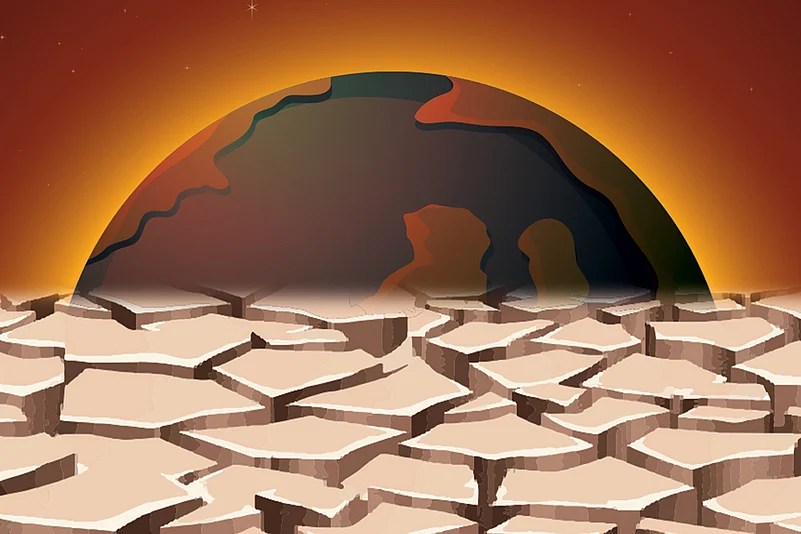Pune-based couple Riddhi and Rakesh (names changed on request) have decided not to have children, not because of time or money constraints, but because they are worried about an uncertain world threatened by heatwaves, droughts, floods and acute water shortage among other disasters. “I think children will not have access to even the basics in the next 30 to 40 years, which will not be fair on them,” says Riddhi, who works with an IT company.
What Riddhi and Rakesh, among an increasing tribe of couples opting out of childbirth over environmental concerns, are going through can be interpreted as climate anxiety or eco-anxiety. The American Psychological Association (APA) defines climate anxiety as “a chronic fear of environmental doom”. It is a relatively new term in psychological studies which has become popular in many parts of the world, especially in the western countries affected by climate change.
India’s Anxiety Storm
According to a research report Global Warming’s Four Indias from the Yale Program on Climate Change Communication and polling agency CVoter International, which was released in May, 82% of Indians are either “alarmed” or “concerned” about global warming. The research team from the Yale Program and CVoter surveyed 4,619 Indians above the age of 18 for a nationally representative study between October 21, 2021, and January 9, 2022. The study considered the public perceptions of regional weather patterns and climate awareness, beliefs, policy support and behaviour as well as vulnerability to extreme weather occurrences.
The study segregated the Indian audience into four distinct sets on the basis of their reaction to global warming: the alarmed, the concerned, the cautious and the disengaged. A majority of the respondents (54%) are alarmed and are aware of the actual threat and reality of global warming.
The issue has become acute enough for mental health professionals to take note. “Though I have not yet got any patient directly anxious over climate change, there are patients who have expressed concern over how their lives have got disrupted due to the impact of climate change. I believe climate change will bring region-specific challenges for people to deal with mentally and physically,” says Shilpi Saraswat, a clinical psychologist at Sakra World Hospital, Bengaluru.
Anthony Leiserowitz, founder and director of the Yale Program and senior research scientist, says that his research team has not measured climate anxiety in India but has done so in the US using a modified measurement of a standard anxiety scale. “We find that there is a small, but not insignificant, percentage of Americans who are experiencing the signs of climate anxiety, and it has almost certainly grown in recent years. I would guess that the proportions are much smaller in India, simply because there is such less awareness of climate change in India versus the US. But it is certainly possible that a higher proportion of Indians are suffering psychological distress due to their experiences of extreme weather events,” says Leiserowitz, one of the two principal investigators of the study.

Jagadish Thaker, a senior lecturer at the University of Queensland and affiliate researcher with the Yale Program, also feels that climate anxiety is already prevalent among many Indians. “Nearly all of the ‘alarmed’ respondents—between 93% and 97%—think global warming will cause either ‘a great deal’ or ‘a moderate amount’ of harm to future generations of people, plants and animal species, to people in India, to people in their community and/or to themselves and their family. There is not a major gap in how they see climate change impacting their own lives and that of plants and animals or future generations,” he notes.
A 2022 report, titled Climate change anxiety in China, India, Japan, and the United States, published in the Journal of Environmental Psychology observes that climate change anxiety was apparently higher in Indian and Chinese samples than among the Japanese and American participants. India was among the top in the world in terms of both vulnerability to climate change impacts and lack of readiness to adapt, it added.
Nagaraj Adve, a founding member of the Teachers Against Climate Change (TACC) who also works and writes on the science, impacts and politics of global warming, believes that extreme events such as flooding, heat waves and erratic rainfall have become much more common and cannot be ignored. “These events are beamed into our living rooms through TV channels and leave an impact on our minds. I have spoken to a lot of young people in Mumbai who have told me that every time it rains heavily in Mumbai, they are reminded of the 2005 floods,” says Adve, who has authored a booklet titled Global Warming in the Indian Context: An Introductory Overview. The 2005 flood occurred when a cloudburst had left the city and other areas of Maharashtra inundated and hundreds of people dead.
Climate anxiety, according to Adve, can be examined through the lens of previous occurrences, the current state and the future. “People are reminded of climate disasters in the past. In the present, they are concerned about crops being damaged by severe rainfall and, for the future, they are concerned about sea-level rise, heat stress and so on. What we need to do is deepen the awareness of climate change and understand what can be done.”
Bhavya Lankaa, a counsellor with Mpower, a mental healthcare centre at Birla Institute of Technology and Science, Hyderabad, says that weather-induced stress has always been an important aspect for psychologists to consider. Now, research is being carried out to establish a connection between climate change and mental health. Saraswat concurs. “Many renowned institutions in India are carrying out studies. It is beginning to be taken seriously,” she says.
Fear of the Young
Bengaluru resident Pavanee Chaturvedi, 15, is rattled by the rising daytime temperature in summer. “It was unbearably hot, something that I have not experienced before. Among friends, we often discuss how climate change can affect our lives ahead. After all, we have our whole future ahead of us, but with these extreme temperatures, it is not going to be a smooth ride. That bothers me a lot,” says Chaturvedi.
The University of Bath, United Kingdom, undertook a comprehensive study of the association between perceived government responsiveness and climate fear in children and young people around the world in 2021. The study covered 10,000 individuals in the age group of 16 to 25 from 10 nations—Australia, Brazil, Finland, France, India, Nigeria, the Philippines, Portugal, the UK and the USA.

More than 45% of respondents stated that their feelings about climate change negatively impacted their daily lives, while nearly 60% said they felt “very” or “extremely” worried about it. In India, 35% of respondents said they were “extremely worried” about climate change. The study published in the Lancet, a medical journal, notes, “Children and young people are thus facing numerous stressors but have few resources to mitigate or avoid them.”
Citing other related studies, the report states, “Qualitative research has found that many children have pessimistic views of climate futures. Interviews conducted with children in various countries between 2016 and 2021 found intense forms of climate and eco-anxiety. Parents and educators also report hearing great concern about climate change from young people.”
“As a teen, change in temperatures has affected me a lot. It makes me feel stressed, annoyed, and vexed. We all can think it is ludicrous to correlate a person’s mental health with climate change, but climate change affects our mental state and causes anxiety directly or indirectly,” said Anandita R.S., a 15-year-old student from Chennai, in a write-up for Bookosmia, a publishing platform for children.
In 2019, 16 youngsters aged between eight and 17 years from 12 countries, including India, filed a complaint with the United Nations Committee on the Rights of the Child against failure by a few countries in leadership position to curb emissions despite being aware of climate changes for decades. The group included Greta Thunberg, a young Swedish climate activist. They spoke about the impacts of climate change on their lives and the mental anxiety and depression about the present and future that it was causing.
Despair and Guilt
Earlier this year, a Belgian man reportedly took his life after interacting with an artificial intelligence-powered chatbot for six weeks about climate change. His wife told the media that the man was extremely eco-anxious and the chatbot encouraged him to end his life to save the planet.
Qualitative research provides evidence that some people are deeply affected by feelings of loss, helplessness and frustration due to their inability to feel like they are making a difference in stopping climate change, according to a report titled Mental Health and Our Changing Climate: Impacts, Implications, and Guidance by the APA and others. “Some writers stress the possible detrimental impact of guilt, as people contemplate the impact of their own behavior on future generations,” it adds.
Despair can also stem from fear of impending doom. A 2018 article, Climate change and mental health: risks, impacts and priority actions, published in the International Journal of Mental Health Systems, states, “The overarching threats of a changing climate, can also incite despair and hopelessness as actions to address the ‘wicked problem’ of climate change seem intangible or insignificant in comparison to the scale and magnitude of the threats.”
While research has traditionally focused on the emergency and crisis stage, post-impact stage and rehabilitation and recovery phase, little attention has been paid to the psychological phenomena that can occur during the pre-disaster phase, the article states. “Such phenomena include ... heightened anxiety levels, feelings of impending doom, hopelessness, and fatalism that can be triggered by approaching extreme events or associated weather warnings,” it adds.
According to People’s Climate Vote 2021, reportedly the largest survey on public opinion on climate change, by the United Nations Development Programme and the University of Oxford, 64% of the respondents from 50 countries considered climate change a global emergency, with 59% of these calling for necessary and urgent response to it.
Seeking Solutions to Anxiety
The deep sense of despair over global warming and climate change is prompting people to demand accountability from relevant quarters, their major focus being on the government. In September last year, following a complaint, the United Nations Human Rights Committee ruled that the Australian government had violated the rights of indigenous Torret Strait islanders by failing to protect them against the adverse impact of climate change. Explaining the government’s accountability, Hélène Tigroudja, a committee member, said, “States that fail to protect individuals under their jurisdiction from the adverse effects of climate change may be violating their human rights under international law.”
The fact that people are unhappy about climate change is visible in the rising number of litigations. Globally, the cumulative number of climate change-related litigation cases has more than doubled since 2015, according to Global trends in climate change litigation: 2022 snapshot by Joana Setzer and Catherine Higham from Grantham Research Institute on Climate Change and the Environment, London School of Economics and Political Science. Just over 800 cases were filed between 1986 and 2014, while over 1,200 cases have been filed in the last eight years, the report added.
A lot of anxiety over climate change stems from people’s lack of confidence in their government’s ability to address these concerns. The study by the University of Bath found that climate anxiety is related to perceived government inaction and associated feelings of betrayal. Around 58% of children and young people surveyed said that governments were “betraying” them and future generations, while 64% said that governments were not doing much to avoid a climate catastrophe.
The onus lies on the governments to not only act on climate change but also reassure people that they have things in control. They will need an out-of-the-box approach in which communication will be integral in keeping people informed of their action and lessening their anxiety.






























